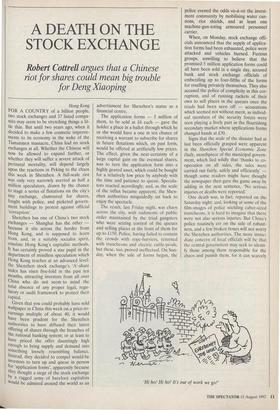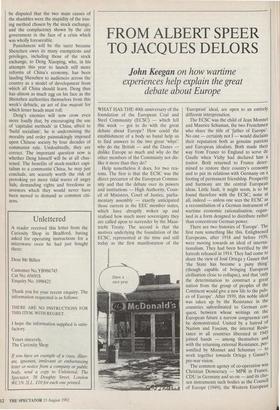A DEATH ON THE STOCK EXCHANGE
Robert Cottrell argues that a Chinese
riot for shares could mean big trouble for Deng Xiaoping
Hong Kong FOR A COUNTRY of a billion people, two stock exchanges and 37 listed compa- nies may seem to be stretching things a lit- tle thin. But until two years ago, when it decided to make a few cosmetic improve- ments to its economy in the wake of the Tiananmen massacre, China had no stock exchanges at all. Whether the Chinese will now be allowed to expand further, or whether they will suffer a severe attack of perinatal mortality, will depend largely Upon the reactions in Peking to the chaos this week in Shenzhen. A full-scale riot was only very narrowly averted as half a million speculators, drawn by the chance to stage a series of flotations on the city's tiny exchange, clamoured for shares, fought with police, and picketed govern- ment buildings to protest against official 'corruption'.
Shenzhen has one of China's two stock exchanges — Shanghai has the other — because it sits across the border from Hong Kong, and is supposed to learn from, and, in a suitably socialist spirit, emulate Hong Kong's capitalist methods. It has certainly proved a star pupil in the department of mindless speculation which Hong Kong teaches at an advanced level: the Shenzhen stock exchange's 'A'-share index has risen five-fold in the past ten months, attracting investors from all over China who do not seem to mind the total absence of any proper legal, regu- latory or audit framework to protect their capital.
Given that you could probably have sold Wallpaper in China this week on a price-to- earnings multiple of about 40, it would have been prudent for the Shenzhen authorities to have diffused their latest offering of shares through the branches of the national banking system; or at least to have priced the offer dauntingly high enough to bring supply and demand into something loosely resembling balance. Instead, they decided to compel would-be investors to turn up and queue in person for 'application forms', apparently because they thought a siege of the stock exchange bY a ragged army of barefoot capitalists would be admired around the world as an advertisment for Shenzhen's status as a financial centre.
The application forms — 5 million of them, to be sold at £6 each — gave the holder a place in a ballot through which he or she would have a one in ten chance of receiving a warrant to subscribe for shares in future flotations which, on past form, would be offered at artificially low prices. The effect, given the near-certainty of a large capital gain on the eventual shares, was to turn the application form into a highly geared asset, which could be bought for a relatively low price by anybody with the time and patience to queue. Specula- tors reacted accordingly; and, as the scale of the influx became apparent, the Shen- zhen authorities misguidedly sat back to enjoy the spectacle.
The result, last Friday night, was chaos across the city, with rudiments of public order maintained by the triad gangsters who were seizing control of the queues and selling places at the front of them for up to .£150. Police, having failed to contain the crowds with rope-barriers, returned with truncheons and electric cattle-prods, but these, too, proved ineffectual. On Sun- day, when the sale of forms began, the
police evened the odds vis-à-vis the invest- ment community by mobilising water can- nons, riot shields, and at least one machine-gun-toting armoured personnel carrier.
When, on Monday, stock exchange offi- cials announced that the supply of applica- tion forms had been exhausted, police were attacked and vehicles burned. Furious groups, unwilling to believe that the promised 5 million application forms could all have been sold in a single day, accused bank and stock exchange officials of embezzling up to four-fifths of the forms for reselling privately themselves. They also accused the police of complicity in this cor- ruption, and of running rackets of their own to sell places in the queues once the triads had been seen off — accusations which seemed not without merit, as individ- ual members of the security forces were seen playing a lively part in the flourishing secondary market where applications forms changed hands at £30.
Signs that the scale of the disaster had at last been officially grasped were apparent in the Shenzhen Special Economic Zone Daily, mouthpiece of the municipal govern- ment, which lied wildly that 'thanks to co- operation on all sides, the sales were carried out fairly, safely and efficiently' — though some readers might have thought the newspaper then gave the game away by adding in the next sentence, `No serious injuries or deaths were reported.'
One death was, in fact, reported on the Saturday night; and, looking at some of the film-images of police wielding caber-sized truncheons, it is hard to imagine that there were not also serious injuries. But China's police routinely err on the side of robust- ness, and a few broken bones will not worry the Shenzhen authorities. The more imme- diate concern of local officials will be that the central government may seek to identi- fy those among them responsible for the chaos and punish them, for it can scarcely 'Hi ho! Hi ho! It's out of work we go!' be disputed that the two main causes of the shambles were the stupidity of the issu- ing method chosen by the stock exchange, and the complacency shown by the city government in the face of a crisis which was wholly foreseeable.
Punishment will be the surer because Shenzhen owes its many exemptions and privileges, including those of the stock exchange, to Deng Xiaoping, who, in his attempts this year to launch still more reforms of China's economy, has been lauding Shenzhen to audiences across the country as a model of development from which all China should learn. Deng thus has almost as much egg on his face as the Shenzhen authorities themselves from this week's debacle, an act of lese majeste for which lesser heads must roll.
Deng's enemies will now crow even more loudly that, by encouraging the use of 'capitalist methods' in China, albeit to 'build socialism', he is undermining the morality and order painstakingly imposed upon Chinese society by four decades of communist rule. Undoubtedly, they are correct. The important question now is whether Deng himself will be at all chas- tened. The benefits of stock-market capi- talism to a communist China, he may just conclude, are scarcely worth the risk of provoking yet more tidal waves of angry Sids, demanding rights and freedoms as investors which they would never have been moved to demand as common citi- zens.
Unlettered
A reader received this letter from the Curiosity Shop in Bradford, having asked for operating instructions for a microwave oven he had just bought there: Dear Mr Billen Customer No.YB986745 Cat No. 65691S Enquiry No. 1098421 Thank you for your recent enquiry. The information requested is as follows:
THERE ARE NO INSTRUCTIONS FOR THIS ITEM, WITH REGRET.
I hope the information supplied is satis- factory.
Yours sincerely, The Curiosity Shop If you have an example of a crass, illiter- ate, ignorant, irrelevant or embarrassing letter or notice from a company or public body, send a copy to Unlettered, The Spectator, 56 Doughty Street, London WC I N 2LL. 10 for each one printed.



















































 Previous page
Previous page